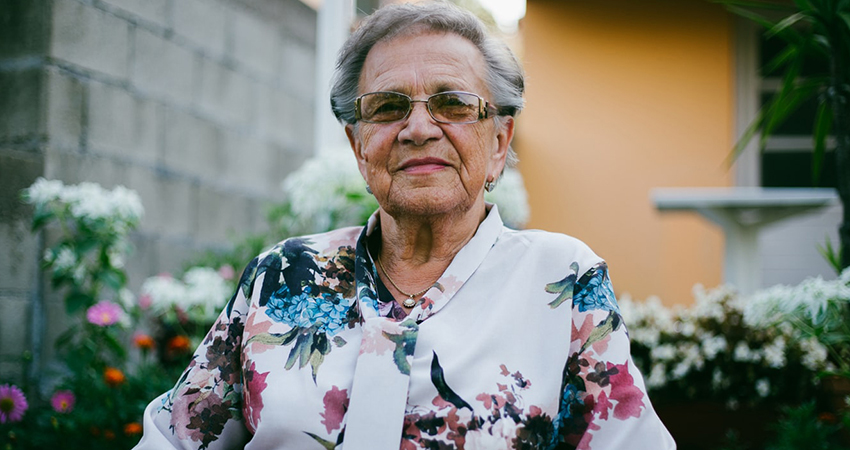What is assisted living and how is it different from a nursing home?

Assisted living is a home-like care facility that provides personal and medical assistance for people (usually older adults) while prioritizing their independence. Those in need of assistance receive services ranging from personal care services and skilled nursing to senior housing.
If your parent is requiring consistent help in their daily lives, it may be time to turn to long-term care. To determine whether assisted living communities are right for your parent, let’s explore how they’re similar and different from nursing homes, which are perhaps a more well-known form of senior care service.
What Is Assisted Living vs. Nursing Home/Long-Term Care Home?
There are two main differences between assisted living facilities (also known as retirement homes) and nursing homes (also known as long-term care homes). First, they vary in the extent of the services and support they provide. Second, there’s a noticeable physical difference between these types of care facilities.
Difference Between the Levels of Care Provided
Nursing homes are known for providing 24-hour assistance for elderly patients who may require immediate medical attention at any time. Residents often live with age-related ailments such as dementia or osteoporosis, which makes it especially difficult for them to function on their own.
Medical assistance is provided for people living in nursing homes. This often includes skilled nursing care, breathing assistance, toileting, full-time monitoring, and emergency services.
On the other hand, assisted living is often provided for older people who may not have a serious illness that affects their quality of life. However, they still need some level of care to help them remain as independent as possible. Or they may want to spend less time cooking and cleaning, and enjoy their life without doing these daily tasks.
Assisted living facilities are less focused on nursing and health care, and more on supporting residents to maintain a safe environment with a high degree of autonomy.
Difference Between the Homes Themselves
What is assisted living vs. a nursing home? Because the level of care and supervision varies, assisted living homes and nursing homes look different.
Nursing homes have more of a hospital-like feel to them with hospital beds, medical equipment, and more thorough medical attention. Still, nursing homes often try to create a comforting environment for residents so that it’s not strictly clinical.
They often have living spaces, dining rooms, and communal areas that try to impart a relatively home-like environment where games, entertainment, and other community-based activities take place.
Assisted living homes are different in this sense. You might be hard-pressed to notice the difference between an apartment or condo complex and some assisted living facilities.
Many assisted living residences promote a home-like environment, with residents personalizing their living quarters with decor and their own furniture.
Similarities Between Assisted Living and Nursing Homes

Although there are a couple of key differences between nursing homes and assisted living, they are both senior living communities with a mission to ensure residents live as safely and comfortably as possible. Here are some of the major similarities between assisted living and nursing homes.
- Nutrition: Assisted living facilities and nursing homes both ensure their guests are fed well and on a regular three-meals-a-day schedule.
- Medication management: It’s common for elderly people to need help remembering to take their medication. Having a supervising staff helps residents stay on track with their well-being and avoid any mishaps or potential emergency room visits.
- A focus on quality of life: In either setting, guests are made to feel welcome and part of a larger community. Beyond addressing immediate physical needs, these facilities want to ensure residents feel fulfilled through hobbies, social engagement, spiritual interests, and other recreational activities.
- Safety: Since safety is an obvious priority, facilities are likely to have handrails and other infrastructure in place to prevent falls and other potential hazards for residents. Also, the security of the facility may also have alarm systems and security guards for added protection.
- Help with daily life: At either type of location, assistance is offered for each guest depending on their level of need. This could be helping your parent with personal hygiene, toileting, medication reminders, or walking.
What to Look for in Assisted Living Communities

To help you and your parent find the right assisted living facility, it’s a good idea to create a checklist of qualifications that must be met. You’ll want to make sure you choose a place that prioritizes safety, cleanliness, and community. Here’s what to consider adding to your checklist in more detail.
The Essentials
While your parent will have to first be assessed and determined to be eligible for a nursing home, there are some questions to ask: Is this a place that best fits my parent’s lifestyle and needs? Are there any restrictions on visits? Is it in our budget? Do they take insurance? You also want to know about the facility’s implementation of safety and how they respond in case of an emergency.
Medical Emergencies
You and your parent will want to choose an assisted living arrangement that responds well to medical emergencies. Although assisted living doesn’t provide the same level of close monitoring as nursing homes, it’s still essential that they know how to respond in the event of dire health trouble.
They should have equipment on hand for such cases, or at least know how to get residents to an emergency room fast. You may want to prioritize choosing a community that’s in close proximity to a hospital.
Costs
Look into whether you can gain financial assistance from your parent’s health coverage or other forms of government assistance. Also, be sure to confirm who is going to be handling any payments — is it going to be you, your parent, other family members, or a combination thereof?
The Community Itself
If you’re honing in on an assisted living community, you and your parent will want to make an in-person visit to get a first-hand experience of the place.
Pay attention to the cleanliness and overall style of the facility. Is it homey? Are there plenty of resources nearby such as grocery stores? Do residents get to participate in daily activities? Determine how easy or challenging it is to get around the grounds. For example, your parent may not want to deal with excessive stairs or an enormous complex.
It would also be nice if the living facility offers plenty of green spaces and other elements to create a peaceful atmosphere, such as fountains. It’s the little things that will ultimately help your parent thrive in community living.
Another important question to ask is, What are the staff members like? Do they promote independent living as much as possible? Are they people who seem helpful, clean, and caring? Can you imagine your parent in their care?
You’ll also want to consider what the residents are like. Are they friendly and welcoming? Do they seem to be happy and thriving?
The most important question is, What does your mom or dad think? After all, this is going to be their home. Choosing an assisted living facility will depend on whether or not your parent can see themselves living there.
Is It Time for Assisted Living?
Moving your elderly parent into an assisted living community can be a very emotional experience for all involved. It can feel like a loss of independence and privacy for your parent and you might feel guilty for even proposing this option. If your parent is capable, it’s their decision.
It’s important to remember that assisted living is not a sign of defeat. Rather, it’s a viable living option that can help ensure your parent’s safety and address their needs. Plus, unlike nursing homes, assisted living facilities foster a sense of self-sufficiency for your mom or dad but with added support.
As you and your parent research different assisted living homes together, use the above guidelines to help ease the transition. Approaching this new phase in a loving, methodical, and compassionate way will help improve your parent’s emotional outlook and keep you focused on finding a place that feels as home-like as possible.
What are your primary concerns about assisted living for your mom or dad? Have you begun to visit any assisted living facilities? How are you and your parent handling this transition? We’d love to hear from you.









i need some help and support.
Hi Candida,
I would need more information before I ca direct you to help and support. What kind of help and support for example do you need and where do you live? Thanks, Jane
Can they have a car ? Can they go places and stay over at families and friends houses? Can they go shopping? Thanks ?
In a word, Tena, yes they can!
Thanks, Jane